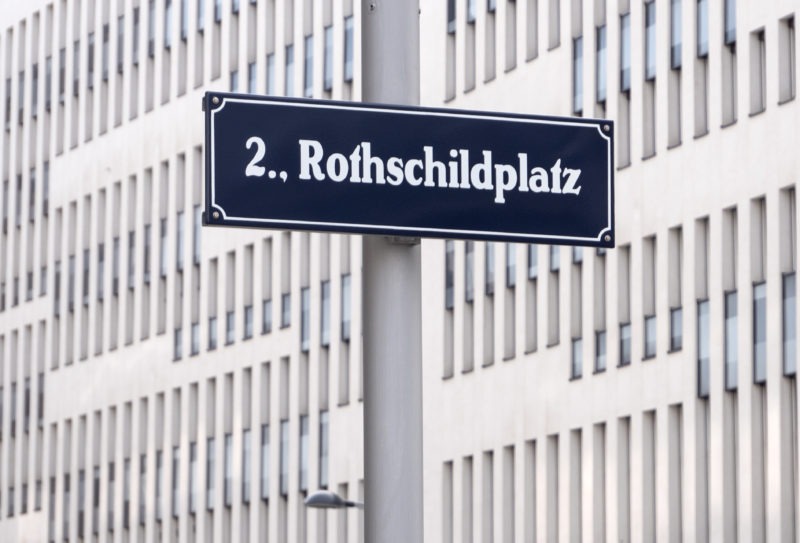Rothschild suit revives family’s Vienna past
Rothschild square, named after the financier Salomon Mayer von Rothschild, was only unvieled in Vienna in 2016 (JOE KLAMAR)
Vienna (AFP) – Fuelling Vienna’s golden age before being driven out by the Nazis, the Rothschilds seemed to have closed the Austria chapter of their Jewish banking family’s saga.
That is until Thursday when Geoffrey Hoguet, a member of Europe’s most famous banking dynasty, marches into court in Vienna.
His suit revolves around a foundation set up in 1907 with the funds of his great-great uncle Nathaniel Freiherr von Rothschild who left the equivalent of about 100 million euros ($110 million) when he died in 1905 to provide psychiatric help for the needy.
Hoguet, a 69-year-old New York investor, is accusing the city of appropriating the foundation in breach of its founder’s will and “perpetuating” Nazi-era laws.
At stake is, among others, a neurological hospital dating from 1912 whose elegant period architecture makes it stand out in a 230-hectare (300-acres) park on the capital’s outskirts.
The lawyer for Vienna argues that the 1956 restoration of the foundation was done “in agreement and according to the initial wishes” of Nathaniel von Rothschild following its dissolution by the Nazis in 1938.
But Hoguet — a financial supporter of Democratic Party presidential nominee Pete Buttigieg — sees this differently and wants to “honour the legacy” of his great-great uncle, according to his entourage quoted by the press.
He wants to annul the sale of one of two sanatoriums in the early 2000s — a late-baroque palace that was reportedly one of the world’s earliest centres of mental health treatment — and aims to nullify a 2017 clause that determines that if the foundation were dissolved its wealth would go to the city of Vienna.
– Ghetto to palaces –
The dispute re-casts the spotlight on Austria’s ambivalent relationship with the Jewish banking family, whose history goes hand-in-hand with the former Habsburg Empire’s financial and commercial success.
“The history of the Rothschilds has been repressed” from Vienna’s collective memory, said Austrian historian Roman Sandgruber, who authored a 2018 book on the history of the Rothschilds’ Austrian branch.
In the early 1800s, the Rothschild patriarch, Mayer Amschel, originally from the Jewish ghetto in Frankfurt, had sent his five sons to develop family affairs in Europe’s major capitals.
His second son Salomon Mayer von Rothschild set up the first bank in Vienna in 1820 and his son Anselm founded Credit-Anstalt in 1855 — Hoguet served on the executive of the bank before it disappeared in the 1990s.
As in London and Paris, the Rothschild bank of Vienna quickly became a crucial partner for those in power.
It helped to finance wars as well as big urban and industrial projects, including mines and railroads — and effectively propped up the monarchy.
“When Emperor Franz-Joseph held protracted discussions with Albert Rothschild, the rumour was that the monarchy was crossing a bad financial stretch,” writes Georg Markus, a journalist and specialist on the Austrian monarchy.
In 1887, the emperor gave Albert Rothschild the right to frequent the imperial court, a rare honour for a Jewish person. Upon his death in 1911, he was considered “the richest man in Europe”, according to Sandgruber.
It was also during this period that Nathaniel, one of Albert’s brothers, a philanthropist more focused on art than finance, made the largest individual donation in Austrian history to create the foundation bearing his name to set up psychiatric hospitals, which were well ahead of the times.
– Wild theories –
But as much as financial success, anti-Semitism too shaped the family saga with the Rothschilds pushed out of Austria when Nazi Germany annexed it in 1938.
“The name Rothschild was both the target of those who stirred crowds with hatred of the Jews, as well as of the anti-capitalists,” Sandgruber told AFP.
Long before the internet age, the wildest theories about the family circulated: one of them claimed that the first of the Viennese Rothschilds, Salomon, was Adolf Hitler’s grandfather, prompting the chancellory at that time to open an investigation.
After the war, the sumptuous family palaces in the centre of Vienna, a Rothschild hospital and a train station funded by the banking establishment were all demolished to make way for modern constructions.
“Not only did the fighting itself damage this heritage, but it was also a story with which Austria was not comfortable,” said Michaela Feurstein-Prasser, author of the “Jewish Vienna” guide.
It was not until 2016 that a Rothschild square was inaugurated in Vienna at the headquarters of the banking group UniCredit Bank Austria, which absorbed Credit-Anstalt in the 1990s.
Disclaimer: Validity of the above story is for 7 Days from original date of publishing. Source: AFP.


